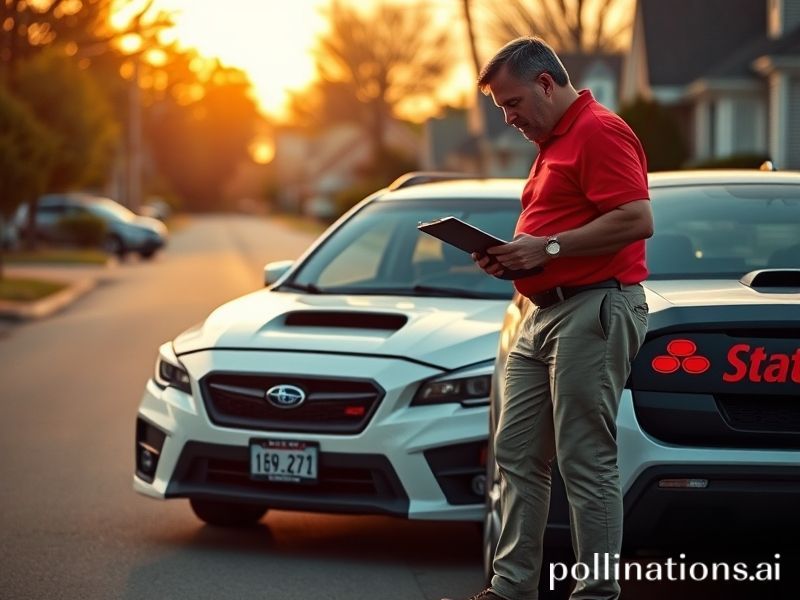State Farm: How a Jingle From Illinois Quietly Became the World’s Insurance Policy
State Farm, the good-neighbor insurer born in 1922 on the flat cornfields of Illinois, has quietly become the planet’s most polite hedge against chaos. While most nations still rely on fickle state budgets or the largesse of a benevolent despot to rebuild after the roof flies off, State Farm now underwrites the suburban dreams of expats in Dubai condos, Californian vineyards that double as tax shelters for Singaporean dentists, and even the occasional Bolivian lithium mine whose tailings ponds look suspiciously like swimming pools on the paperwork. In short, the jingle that once sold auto policies to Buick-owning Rotarians has metastasized into a planetary safety blanket stitched together with actuarial tables and the faint smell of printer toner.
Zoom out and the math gets almost poetic. Every time a monsoon in Kerala parks itself over a gated community built by a Canadian pension fund, someone in Bloomington, Illinois, signs a check that crosses twelve time zones before breakfast. The firm’s reinsurance web—spun through Bermuda shell companies, Lloyd’s syndicates, and a discreet office above a Viennese pastry shop—means that when a rogue crane in Lagos topples onto a diplomat’s Tesla, the ripple is felt in the same Iowa cubicle farm that once handled claims for hail-damaged silos. Globalization’s finest punch line: a corn-belt mutual now backstops the collateral damage of late capitalism everywhere the Wi-Fi reaches.
Naturally, regulators on three continents pretend to supervise this with the enthusiasm of substitute teachers on a Friday afternoon. The EU demands “climate stress tests” that resemble high-school pop quizzes; Chinese authorities politely ask for a list of policyholders who also own sensitive battery patents; and in Washington, a bipartisan committee can’t decide whether to subpoena the CEO or simply ask him to sing the jingle at the next hearing. Meanwhile, State Farm’s algorithms—trained on everything from satellite wildfire data to TikTok mood swings—quietly price the odds that your retirement villa in Portugal will still be there next summer. Spoiler: the villa’s fine; the vineyard next door just became a deductible.
The geopolitical elegance is hard to ignore. When French farmers blockade Paris over diesel taxes, their tractors are insured by subsidiaries of subsidiaries ultimately anchored back in Illinois. When an Australian influencer torches her kitchen filming flambé content, she’s reimbursed by the same pool of money that once rebuilt a Methodist church after a 1950s tornado. The world burns, floods, and live-streams itself into oblivion, but the indemnity checks clear in fourteen currencies—proof that human folly is the one truly borderless commodity.
Of course, even omnipresence has its hiccups. Last year, State Farm’s chatbot—trained to soothe rattled policyholders with Midwestern empathy—accidentally offered a Kenyan goat herder a free rental car while his flock was carried off by flash floods. The incident trended under #LikeAGoodNeighborSendGoats, prompting a corporate apology and a new clause excluding “hooved transport.” Somewhere, an actuary updated the model, noted that goats now outnumber sedans in certain postal codes, and quietly raised premiums on anyone whose TikTok bio includes the word “homesteader.”
And yet, in a world where national governments treat climate adaptation like a group project nobody wants to lead, State Farm’s spreadsheets have become the closest thing we have to a planetary ledger of risk. Every hurricane deductible, every cyber-extortion rider, every fine-print exclusion for “acts of vaguely defined cyber-war” is a tiny admission that the nation-state is just another brand in the marketplace of reassurance. Buy the policy, hum the jingle, and hope the adjuster arrives before the next headline.
So here’s to State Farm: the corn-fed colossus selling sleep insurance to a species that insists on learning nothing. May your call centers stay open 24/7, your chatbots master every accent from Glaswegian to Gujarati, and your actuaries keep finding creative ways to say “we told you so” in premium adjustments. Because when the waters rise and the satellites blink out, someone still has to decide which porch gets rebuilt and which becomes a charming snorkeling site. Like a good neighbor, indeed—just don’t read the fine print about rising sea levels.







